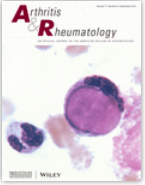 Interstitial lung disease (ILD) accompanied by anti-melanoma differentiation-associated gene 5 (MDA5)-positive dermatomyositis (DM) is often rapidly progressive and associated with poor prognosis. Because there is no established treatment, we prospectively evaluated the efficacy and safety of a combined immunosuppressive regimen for anti-MDA5-positive DM with ILD.
Interstitial lung disease (ILD) accompanied by anti-melanoma differentiation-associated gene 5 (MDA5)-positive dermatomyositis (DM) is often rapidly progressive and associated with poor prognosis. Because there is no established treatment, we prospectively evaluated the efficacy and safety of a combined immunosuppressive regimen for anti-MDA5-positive DM with ILD.
Adult Japanese patients with newly onset anti-MDA5-positive DM with ILD (n = 29) were enrolled in multiple centers from 2014 to 2017. They were treated with a regimen of high-dose glucocorticoids (GC), tacrolimus, and intravenous cyclophosphamide (IVCY). Plasmapheresis was used if patients worsened after the regimen started. The primary endpoint was six-month survival, compared with that of a historical control (n = 15) of patients with anti-MDA5-positive DM with ILD who received step-up treatment (high-dose GC and stepwise addition of immunosuppressant). Secondary endpoints were 12-month survival rate, adverse events, and changes in laboratory data.
The combined immunosuppressive regimen group showed significantly higher 6-month survival than the step-up treatment group (89% and 33%, respectively, P < 0.0001). Over 52 weeks, anti-MDA5 titer, serum ferritin level, percent vital capacity, and chest high-resolution computed tomography scores improved. The combined immunosuppressive regimen group received IVCY nearly 20 days earlier with shorter intervals and tended to receive plasmapheresis more often than patients undergoing step-up treatment (n = 15). Cytomegalovirus reactivation was frequently observed over 52 weeks.
Acombined immunosuppressive regimen is effective for anti-MDA5-positive DM with ILD. Plasmapheresis can be used for additional effect in intractable disease. Opportunistic infections should be carefully monitored during treatment.
